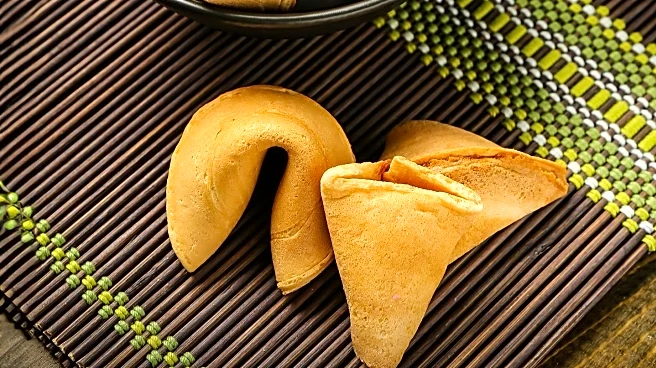What's Happening?
Fortune cookies, often associated with Chinese cuisine, are actually an American invention, created by Japanese immigrants in California in the early 20th century. These cookies have become a cultural icon, blending mysticism, humor, and marketing. Today,
fortune cookies are a global industry, with around 3 billion produced annually, mostly in the United States. In Israel, fortune cookies are popular for branding and events, with custom messages tailored to clients' needs. The sole fortune cookie factory in Israel, located in Kibbutz Dafna, produces about 6,500 cookies daily, catering to diverse clients including businesses and private individuals.
Why It's Important?
Fortune cookies represent a unique blend of cultural adaptation and commercial success, highlighting the influence of immigrant communities on American culinary traditions. Their widespread popularity underscores the power of cultural symbols in marketing and branding. The ability to customize messages within fortune cookies offers businesses a creative way to engage with customers, making them a versatile tool for promotions and events. This phenomenon illustrates the intersection of food, culture, and commerce, showcasing how culinary innovations can transcend their origins to become global staples.
What's Next?
The fortune cookie industry may continue to evolve, with potential for further customization and innovation in cookie design and messaging. As businesses seek unique ways to connect with consumers, fortune cookies could play a role in personalized marketing strategies. The industry might explore new flavors or ingredients to enhance the cookie's appeal, while maintaining its iconic status. Additionally, the cultural significance of fortune cookies could inspire similar innovations in other culinary traditions.
Beyond the Headlines
The story of fortune cookies highlights the broader narrative of cultural exchange and adaptation, reflecting how immigrant communities contribute to and reshape national identities. This culinary invention serves as a reminder of the dynamic nature of cultural symbols and their ability to foster connections across diverse populations. The fortune cookie's journey from a simple tea ceremony treat to a global phenomenon exemplifies the transformative power of cultural integration.

















